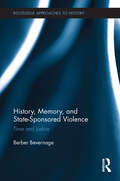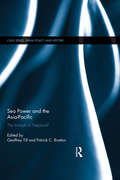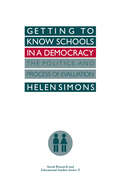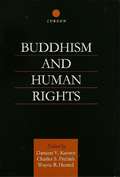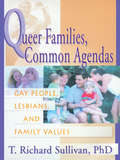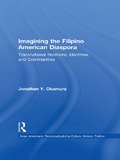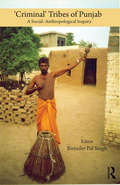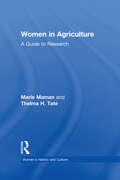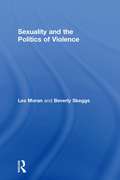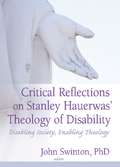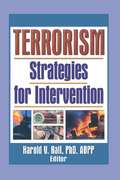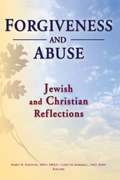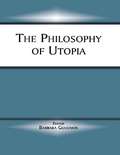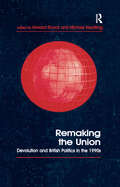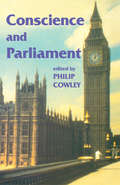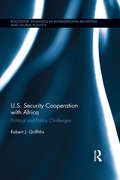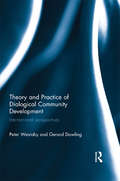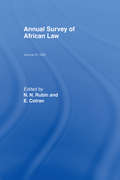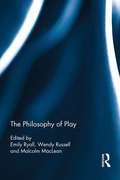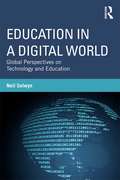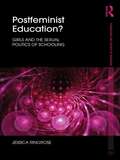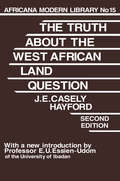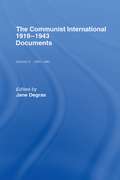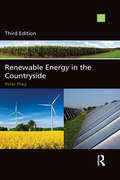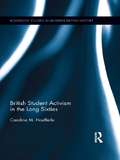Special Collections
Benetech’s Global Certified Accessible Titles
Description: Benetech’s GCA program is the first independent third-party EPUB certification to verify ebook accessibility. By creating content that is born accessible, publishers can meet the needs of all readers. Learn more: https://bornaccessible.benetech.org/
- Table View
- List View
History, Memory, and State-Sponsored Violence
by Berber BevernageModern historiography embraces the notion that time is irreversible, implying that the past should be imagined as something ‘absent’ or ‘distant.’ Victims of historical injustice, however, in contrast, often claim that the past got ‘stuck’ in the present and that it retains a haunting presence. History, Memory, and State-Sponsored Violence is centered around the provocative thesis that the way one deals with historical injustice and the ethics of history is strongly dependent on the way one conceives of historical time; that the concept of time traditionally used by historians is structurally more compatible with the perpetrators’ than the victims’ point of view. Demonstrating that the claim of victims about the continuing presence of the past should be taken seriously, instead of being treated as merely metaphorical, Berber Bevernage argues that a genuine understanding of the ‘irrevocable’ past demands a radical break with modern historical discourse and the concept of time. By embedding a profound philosophical reflection on the themes of historical time and historical discourse in a concrete series of case studies, this project transcends the traditional divide between ‘empirical’ historiography on the one hand and the so called ‘theoretical’ approaches to history on the other. It also breaks with the conventional ‘analytical’ philosophy of history that has been dominant during the last decades, raising a series of long-neglected ‘big questions’ about the historical condition – questions about historical time, the unity of history, and the ontological status of present and past –programmatically pleading for a new historical ethics.
Sea Power and the Asia-Pacific
by Geoffrey Till and Patrick C. BrattonWith particular focus on the Asia-Pacific region, this book examines the rise and fall of sea powers. In the Asia-Pacific region there has been significant expansion of sea-based economies together with burgeoning naval power. Many claim that these processes will transform the world’s future economic and security relationships. The book addresses the question of to what extent the notion of ‘Asia rising’ is reflected by and dependent on its developing sea power. A central theme is the Chinese challenge to long-term Western maritime ascendency and what might be the consequences of this. In order to situate current and future developments this book includes chapters which analyse what sea power means and has meant, as well as its role, both historic and contemporary, in the rise and fall of great powers. This book will be of much interest to students of naval power, Asian politics, strategic studies, war and conflict studies, IR and security studies.
Getting To Know Schools In A Democracy
by Helen SimonsFirst published in 1987. Routledge is an imprint of Taylor & Francis, an informa company.
Buddhism and Human Rights
by Damien Keown and Charles S. Prebish and Wayne R. HustedIt is difficult to think of a more urgent question for Buddhism in the late twentieth century than human rights. The political, ethical and philosophical questions surrounding human rights are debated vigorously in political and intellectual circles throughout the world and now in this volume.
Queer Families, Common Agendas
by Richard SullivanVital information on family services, custody, and access rights for gay parents!Queer Families, Common Agendas: Gay People, Lesbians, and Family Values examines the real life experience of those affected by current laws and policies regarding homosexual families. The book will help policy makers, lawyers, social workers, and the general public better understand these families. Here you will be able to compare the progress of policy in the U.S. and Canada for gay and lesbian parents and their children and explore relevant legal approaches in the two countries. In Queer Families, Common Agendas: Gay People, Lesbians, and Family Values, a range of strategies for advancing the rights of sexual minority parents are considered for legal feasibility and political viability. You will gain insight into the contradictions in policies and practices that ultimately disadvantage children based on their family origins, and you will discover alternative approaches for improved services to homosexual families. Queer Families, Common Agendas explores: family law and protection of women-headed households legal definitions of motherhood and fatherhood in the United States, Canada, and the United Kingdom family and adoption idealogies concerning gay families and their rights to adopt new ways to make social services responsive to minority families the lesbian and gay “agenda” the value of family and the family of values--as opposed to the worn-out phrase “family values” Queer Families, Common Agendas serves as a primer to assist you in understanding the legal struggles that lesbian and gay families are facing today. You will explore concerns about family law, protection of women-headed households, motherhood, fatherhood, adoption and family ideology, and how to make social services responsive to gay and lesbian families. This excellent reference provides you with the necessary background and techniques to create services that are responsive and effective with sexual minority families.
Imagining the Filipino American Diaspora
by Jonathan Y. OkamuraFirst published in 1998. Routledge is an imprint of Taylor & Francis, an informa company.
'Criminal' Tribes of Punjab
by Birinder Pal SinghOne of the important projects launched by the British government in the late 19th century was the preparation of a detailed census of the demographic profile of the Indian population across the country. Unable to understand the cultural pluralism that characterizes Indian unity in variety, the census was riddled with problems of definition and categories. This book is a comprehensive ethnographic account of seven tribes in Punjab, classified as ‘criminal’ by the British administration, in order to make some sense of their alleged criminality: Bauria, Bazigar Banjara, Bangala, Barad, Gandhila, Nat and Sansi. The problem of definition of tribe and the issue of criminality are discussed critically. More importantly, the book shows that, contrary to the claims of the Punjab government, these ‘ex-criminal’ tribes still exist and constitute the poorest of the poor in an otherwise prosperous state. It also addresses to a significant current development of various Denotified Tribes’ Associations in Punjab (and other states as well) that have already started raking their long pending demand of Scheduled Tribe status. It is suggested that if their demands are not suitably addressed to they may take recourse to the Gujjar way of resolving conflict as in Rajasthan. As tribes the world over are slowly facing extinction, this important book will serve to archive the ethnographies of these ‘ex-criminal’ tribes. An unusual feature of the book is the voices of a few of the elderly in these tribes whose reminiscences about their traditions, beliefs and practices have been documented. The book will be valuable for those in the fields of sociology, anthropology, social history, tribal and ethnic studies, cultural and folk studies.
Women in Agriculture
by Marie Maman and Thelma H. TateFirst published in 1996. Routledge is an imprint of Taylor & Francis, an informa company.
Sexuality and the Politics of Violence and Safety
by Beverley Skeggs and Les MoranSexuality and the Politics of Violence offers a timely and critical exploration of issues of safety and security at the centre of responses to violence. Through a multi-disciplinary analysis, drawing on feminism, lesbian and gay studies, sociology, cultural geography, criminology and critical legal scholarship, the book offers to transform the way we understand and respond to the challenges raised by violence. It breaks new ground in its examination of the rhetoric and politics of violence, property, home, cosmopolitanism and stranger danger in the generation of safety and security. Using interviews, focus groups and surveys with lesbians and gay men, Sexuality and the Politics of Violence draws upon 'real life' experiences of safety and security. It raises some fundamental challenges to the law and order politics of existing scholarship and activism on homophobic hate crime.
Critical Reflections on Stanley Hauerwas' Theology of Disability
by John SwintonNo other mainstream theologian has so consistently and trenchantly taken a stand with and for people with developmental disabilities.John SwintonCritical Reflections on Stanley Hauerwas&’ Theology of Disability: Disabling Society, Enabling Theology examines the influential writings of one of the most important contemporary theologians. Over the past thirty years, Time magazine Theologian of the Year (2001) Dr. Stanley Hauerwas has consistently presented a theological position which values the deep theological significance of people with developmental disabilities, as well as their importance to the life and the faithfulness of the church. Ten key Hauerwas essays on disability are brought together in a single volumeessays which reflect and illustrate his thinking on the theology of disability, along with responses to each essay from multidisciplinary authoritative sources including Jean Vanier, Michael Bérubé, John O'Brien and Ray S. Anderson.Dr. Hauerwas has always been a fearless voice in the field of theology. Critical Reflections on Stanley Hauerwas&’ Theology of Disability: Disabling Society, Enabling Theology presents his work on the true meaning of disability and provides critical multidisciplinary discussions about his challenging ideas and their validity. In his essays, Hauerwas discusses his views on issues such as the social construction of developmental disabilities, the experience of profound developmental disabilities in relation to liberal society, and the community as the hermeneutic of the gospel. Included is a new essay by Dr. Hauerwas responding to the contributors to the book.Critical Reflections on Stanley Hauerwas&’ Theology of Disability: Disabling Society, Enabling Theology explores Hauerwas&’ thoughts on: the political nature of disability in liberal society the creation of a society where there is more love the dimensions of what is normal the key role of those treated as outsiders in building community the theological understanding of parenting which places responsibility for the individual child firmly within the Christian community using the model of the church as a social ethic developmental disability being equated with suffering the concept of the person in the theology of disability the developmentally disabled and the criteria for humanhood the importance of family in the process of caring for people with developmental disabilitiesCritical Reflections on Stanley Hauerwas&’ Theology of Disability: Disabling Society, Enabling Theology is a fascinating exploration of contemporary theological reflection on disability and is essential reading for students and teachers of practical theology, pastoral counselors, clergy, chaplains, and social and health care students.
Terrorism
by Harold Hall VAn essential resource for anyone working against terrorism in any form it may take! Written for threat assessment professionals in the post-9/11 era, this timely book will help you understand the motivation to commit acts of terror, the thinking patterns common to many terrorists, the psychology of Muslim fundamentalists, methods for predicting the likelihood of chemical/biological attacks, and a great deal more. You&’ll learn about hostage/barricade situations and the role of the crisis negotiator, including victim/perpetrator psychology and factors that indicate progress is being made in a crisis negotiation and factors that imply imminent lethality. After reading Terrorism: Strategies for Intervention, you&’ll have a better understanding of: biological, social, and psychological constructs that are important to understanding group violence the role of emotions in violence the history of chemical/biological weapons use from 1978 to the present, and methods of predicting the likelihood and origins of such attacks the importance of concurrent sequences in relation to chemical/biological attacks hostage/barricade situations, the makeup of crisis negotiation teams, and the role of the crisis negotiator hostage incident databaseswhere to find them, what they contain, and how they can be used effectively six different types of hostage takers and what strategies have the best chance of bringing each type&’s crises to an end factors that indicate progress is being made in a crisis negotiation and factors that imply imminent lethality ethical concerns for forensic consultants when dealing with the issues surrounding terrorism Here is a sample of what you&’ll find in this informative and well-referenced book: Terrorism as Group Violence illustrates the complexity of terrorism and the need to consider the interplay of biological, social, and psychological influences on terrorist behavior. This chapter identifies the constructs and data generated by theories of violence that are relevant to terrorism. Next, profiles of terrorists&’ motivations are scrutinized, followed by a probing of the specific patterns of thinking salient to their motivations. Finally, approaches to solving the terrorist problem are framed. Five handy tables make important points easy to access and understand. Chemical and Biological Violence: Predictive Patterns in State and Terrorist Behavior is essential reading for any serious evaluator of chemical and biological weapons. This chapter uses the Lethal Violence Sequence as a means to help predict chemical/biological weapons use by religious and ethno-nationalist terrorist groups. It includes case vignettes, data categories that can help make predictions more accurate, and a discussion of solutions for use by individuals, law enforcement and federal anti-terrorist agencies, as well as manufacturers and other industry entities, plus a consideration of government and international efforts. Negotiating Crises: The Evolution of Hostage/Barricade Crisis Negotiations examines multiple ways by which a crisis incident can be classified, analyzes the results of hostage incident databases, discusses negotiation techniques, and explores the impact of captivity on the victim. The author reveals important characteristics of hostage/barricade situations that can be vital to the success of the evaluator/negotiator. Six informative tables in this section make statistics and procedures easy to understand. Ethical Concerns in Forensic Consultation Regarding National Safety and Security provides an essential overview of the ethical challenges that mental health professionals and behavioral scientists face when they consult on matters of national security and safety. This chapter delivers useful guidance for professionals who
Forgiveness And Abuse: Jewish And Christian Reflections
by Marie Fortune and Joretta MarshallExplore what forgiveness means in the context of sexual and domestic abuse! Using research, studies, stories, and prayer, Forgiveness and Abuse: Jewish and Christian Reflections focuses on the views and opinions of these two prominent religions as well as shares the wisdom of their traditional teachings. Forgiveness is an essential concept for many survivors of abuse as well as the perpetrators. Some believe that urging victims to simply forgive and forget in the face of such harsh realities may not be practical and could actually endanger the healing process. Forgiveness and Abuse studies several aspects of the spiritual influence in forgiving and vindicating abusive crimes, including: traditional views of forgiveness and repentance using excerpts from Jewish law a clinical study examining the relationship between forgiveness and mental health as well as comparing Christian and Jewish responses to a questionnaire regarding forgiveness abuse of children and adults by members of the clergy: the roles of the victims, the abuser, and the church the differences between forgiveness and reconciliation and whether they are both necessary so much more! Several of the historical practices of Christianity and Judaism regarding abuse, its public acknowledgment, and its forgiveness have been harshly criticized. Forgiveness and Abuse offers you new insight on the spiritual connections between religion, abuse, and forgiveness, and brings you hope as religious leaders unite to better themselves and others. With the events of recent years weighing on society&’s shoulders, this collection is profoundly significant for clergy, counselors, therapists, and survivors, as well as the perpetrators themselves.
The Philosophy of Utopia
by Barbara GoodwinThis collection addresses the important function of utopianism in social and political philosophy and includes debate on what its future role will be in a period dominated by dystopian nightmare scenarios.
Remaking the Union
by Michael Keating and Howard ElcockThis volume addresses the issues arising from the recent devolution referenda by exploring the historical development of the proposals, the importance of national and regional identities, the changing policies of the political parties and the approaches of business and other major groups towards devolution. It also looks at the impact on electoral reform coming from the proposal that proportional representation be used to elect the regional assemblies and how the new assemblies are to be financed. Finally the book discusses the implications of a devolved British state where different countries and regions achieve different levels of autonomy at different paces.
Conscience and Parliament
by Philip CowleyConsidering how the British policy process deals with "conscience" issues, this book covers eight topics discussed by Parliament in the last quarter of a century - abortion, censorship, divorce, Sunday trading, homosexuality, war crimes, disability rights and animal welfare.
U.S. Security Cooperation with Africa
by Robert J. GriffithsAs Africa’s strategic importance has increased over the past decade and a half, United States security cooperation with the continent has expanded. The most visible dimension of this increased engagement was the establishment of the U.S. Military Command for Africa (AFRICOM). Some critics are skeptical of AFRICOM’s purpose and see the militarization of U.S. Africa policy while others question its effectiveness. Recognizing the link between development and security, AFRICOM represents a departure from the traditional organization of military commands because of its holistic approach and the involvement of the Department of State as well as other U.S. government stakeholders. Nevertheless, AFRICOM’s effort to combine security and development faces formidable conceptual and operational challenges in trying to ensure both American and African security interests. The human security perspective’s emphasis on issues that go beyond traditional state-centered security to include protecting individuals from threats of hunger, disease, crime, environmental degradation, and political repression as well as focusing on social and economic justice is an important component of security policy. At the same time, the threat of violent extremism heavily influences U.S. security cooperation with Africa. In this examination of the context of U.S.-African security relations, Robert J. Griffiths outlines the nature of the African state, traces the contours of African conflict, surveys the post-independence history of U.S. involvement on the continent, and discusses policy organization and implementation and the impact of U.S. experiences in Iraq and Afghanistan on the U.S.-Africa security relationship. Africa’s continuing geostrategic significance, the influence of China and other emerging markets in the region, and America’s other global engagements, especially in light of U.S. fiscal realities, demonstrate the complexity of U.S.-African security cooperation.
Theory and Practice of Dialogical Community Development
by Peter Westoby and Gerard DowlingThis book proposes that community development has been increasingly influenced and co-opted by a modernist, soulless, rational philosophy - reducing it to a shallow technique for ‘solving community problems’. In contrast, this dialogical approach re-maps the ground of community development practice within a frame of ideas such as dialogue, hospitality and depth. For the first time community development practitioners are provided with an accessible understanding of dialogue and its relevance to their practice, exploring the contributions of internationally significant thinkers such as P. Freire, M. Buber, D. Bohm and H.G Gadamer, J. Derrida, G. Esteva and R. Sennett. What makes the book distinctive is that: first, it identifies a dialogical tradition of community development and considers how such a tradition shapes practice within contemporary contexts and concerns – economic, social, political, cultural and ecological. Second, the book contrasts such an approach with technical and instrumental approaches to development that fail to take complex systems seriously. Third, the approach links theory to practice through a combination of storytelling and theory-reflection – ensuring that readers are drawn into a practice-theory that they feel increasingly confident has been 'tried and tested' in the world over the past 25 years.
Annual Survey of African Law Cb
by N. N. Rubin, E. CotranFirst published in 1973. Routledge is an imprint of Taylor & Francis, an informa company.
The Philosophy of Play
by Emily Ryall and Wendy Russell and Malcolm MacLeanPlay is a vital component of the social life and well-being of both children and adults. This book examines the concept of play and considers a variety of the related philosophical issues. It also includes meta-analyses from a range of philosophers and theorists, as well as an exploration of some key applied ethical considerations. The main objective of The Philosophy of Play is to provide a richer understanding of the concept and nature of play and its relation to human life and values, and to build disciplinary and paradigmatic bridges between scholars of philosophy and scholars of play. Including specific chapters dedicated to children and play, and exploring the work of key thinkers such as Plato, Sartre, Wittgenstein, Gadamer, Deleuze and Nietzsche, this book is invaluable reading for any advanced student, researcher or practitioner with an interest in education, playwork, leisure studies, applied ethics or the philosophy of sport.
Education in a Digital World
by Neil SelwynDrawing on a wealth of theoretical and empirical work, Education in a Digital World tackles a number of pressing questions, such as, how are ‘global’ trends in educational technology refracted through national policies and processes? How exactly are educational technologies linked to issues of global economics and the fortunes of national and international economies? To what extent are digital technologies implicated in the commercialisation, marketization and commodification of education? These questions, and others, are addressed throughout eight wide-ranging chapters, which consider topics such as the national policy strategies of countries across North and South America, Europe and East Asia, the educational technology portfolios of international organizations such as the United Nations and Microsoft, as well as the role of education and technology in international development and the on-going efforts to provide ‘one laptop per child’ across low-income regions and countries. Through these examples Selwyn develops a detailed analysis of education, technology and globalisation, drawing together arguments and debates from various academic perspectives. Written in a detailed but accessible manner, this is an essential book for anyone wishing to gain a better understanding of the role of education and technology in contemporary globalised society.
Postfeminist Education?
by Jessica RingroseThis book challenges a contemporary postfeminist sensibility grounded not only in assumptions that gender and sexual equality has been achieved in many Western contexts, but that feminism has gone ‘too far’ with women and girls now overtaking men and boys - positioned as the new victims of gender transformations. The book is the first to outline and critique how educational discourses have directly fed into postfeminist anxieties, exploring three postfeminist panics over girls and girlhood that circulate widely in the international media and popular culture. First it explores how a masculinity crisis over failing boys in school has spawned a backlash discourse about overly successful girls; second it looks at how widespread anxieties over girls becoming excessively mean and/or violent have positioned female aggression as pathological; third it examines how incessant concerns over controlling risky female sexuality underpin recent sexualisation of girls' moral panics. The book outlines how these postfeminist panics over girlhood have influenced educational policies and practices in areas such as academic achievement, anti-bullying strategies and sex-education curriculum, making visible the new postfeminist, sexual politics of schooling. Moving beyond media or policy critique, however, this book offers new theoretical and methodological tools for researching postfeminism, girlhood and education. It engages with current theoretical debates over possibilities for girls’ agency and empowerment in postfeminist, neo-liberal contexts of sexual regulation. It also elaborates new psychosocial and feminist Deleuzian methodological approaches for mapping subjectivity, affectivity and social change. Drawing on two UK empirical research projects exploring teen-aged girls’ own perspectives and responses to postfeminist panics, the book shows how real girls are actually negotiating notions of girls as overly successful, mean, violent, aggressive and sexual. The data offers rich insight into girls’ gendered, raced and classed experiences at school and beyond, exploring teen peer cultures, friendship, offline and online sexual identities, and bullying and cyberbullying. The analysis illuminates how and when girls take up and identify with postfeminist trends, but also at times attempt to re-work, challenge and critique the contradictory discourses of girlhood and femininity. In this sense the book offers an opportunity for girls to ‘talk back’ to the often simplistic either wildly celebratory or crisis-based sensationalism of postfeminist panics over girlhood. This book will be essential reading for those interested in feminism, girlhood, media studies, gender and education.
Truth About the West African Land Question
by J.E. Casely HayfordHayford, an African Nationalist, argues that the preservation of the indigenous land tenure system was vital if the values of pre-colonial Africa was to be maintained. First published in 1913.
Communist International
by Jane DegrasPublished in the year 1971, Communist International is a valuable contribution to the field of Politics.
Renewable Energy in the Countryside
by Peter PragClimate change has become a major international issue and the British Government is committed to meeting ambitious targets for reducing greenhouse gas emissions within the present decade and beyond. Much of this will rely on an increasing use of renewable energy. Within current technology this will depend almost exclusively upon the use of rural land, whether for wind turbines, for growing biomass and biofuels or for the production of biogas. Renewable energy is therefore of immediate interest to farmers and landowners and to their advisers, such as surveyors, lawyers, accountants and bankers, as well as to planners and conservationists. This is one of very few books which addresses the issue of renewable energy from the point of view of landowners, farmers and rural land managers – those people who must make important decisions about how, where and when to install renewable energy sources on their land and the business implications of the decisions they make. The third edition of Renewable Energy in the Countryside contains a new chapter on biogas, up-to-date discussions on the implications of the Renewable Heat Initiative and new opportunities for solar energy and ground source heat in the context of farms and country houses as well as the implications of changes in UK planning policies.
British Student Activism in the Long Sixties
by Caroline HoefferleBased on empirical evidence derived from university and national archives across the country and interviews with participants, British Student Activism in the Long Sixties reconstructs the world of university students in the 1960s and 1970s. Student accounts are placed within the context of a wide variety of primary and secondary sources from across Britain and the world, making this project the first book-length history of the British student movement to employ literary and theoretical frameworks which differentiate it from most other histories of student activism to date. Globalization, especially of mass communications, made British students aware of global problems such as the threat of nuclear weapons, the Vietnam War, racism, sexism and injustice. British students applied these global ideas to their own unique circumstances, using their intellectual traditions and political theories which resulted in unique outcomes. British student activists effectively gained support from students, staff, and workers for their struggle for student’s rights to unionize, freely assemble and speak, and participate in university decision-making. Their campaigns effectively raised public awareness of these issues and contributed to significant national decisions in many considerable areas.
